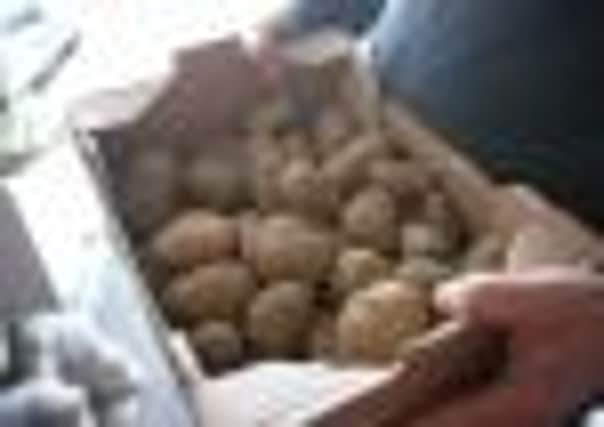Potato industry sees upside of low yield


Although most were reluctant to put a figure on the final yield with at least a month’s growth still to go, one well-known agronomist reckoned that the final UK tonnage for 2012 would be 20 per cent below the normal, which would knock one million tonnes out of the equation.
Potato Council chairman and East Lothian farmer Allan Stevenson was not certain on the scale of the reduced yield but he was sure the crop would be “much smaller” than in a typical growing season.
Advertisement
Hide AdAdvertisement
Hide Ad“We should first of all welcome the fact that there will not be a surplus this year,” he said. “That is good news for growers who, for the past few years, have been selling at below the cost of production.
“We are seeing some inflation in the price growers are currently getting and that is sorely needed. I hope it is permanent. It will bring us into a new era and that will be good news for the industry.”
He estimated that with the reduced yields, costs of production were now running at about £200 per tonne, but for those growers who had signed supply contracts, they would not be getting anything like that for their crop.
Those on contracts might also face difficulties as the reduced yield would bring different samples than those originally aimed for especially for those growing for the baker market.
Stevenson advised all growers on contracts to speak to their buyers to let them know the potential failings within their crops.
These discussions should also include skin quality, as Stevenson reckoned the current high level of skin finish on pre-packed potatoes was “unsustainable” in the longer term.
“Consumers may in future be presented with potatoes with less-than-perfect skin finishes. In many other countries, such as the United States, consumers prefer a more natural skin finish. If this year gives us the opportunity to persuade consumers that slight blemishes do not spoil the taste, then that is good.”
He added that potatoes were not a price sensitive item in the shoppers’ baskets although he admitted that, in these recessionary times, more “value packs” were being bought than before.
Advertisement
Hide AdAdvertisement
Hide AdMeanwhile, growers attending the Potatoes in Practice event were told by Robert Burns, the head of seed exports, that the all-important Egyptian market was prepared to take up to 10 per cent of any contract at a lower grade than previously such was their support for the Scottish seed trade.
“They are still terrified of importing dickeya – a bacterial disease – from the Netherlands and will accept A-grade crops from Scotland with no financial penalty.”
This is good news for growers who have battled with blackleg and seen their crops downgraded as a result.
However, Dr John Kerr, of science and advice at the Scottish agriculture department, which is responsible for seed inspections, said that blackleg infection rates were lower than last year.
He praised growers for following advice last year in helping to reduce levels of infection.